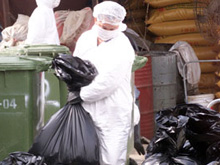
The government plans to introduce a compulsory termination scheme for all existing live poultry farmers, wholesalers and retailers if an avian flu outbreak occurs in the territory.
Health officials told lawmakers yesterday at a Legislative Council health services panel meeting that the government must put in place a comprehensive contingency plan to deal with a possible outbreak as avian influenza viruses are becoming more pathogenic in the region.
"The World Health Organization (WHO) has warned repeatedly in the past year that another influenza pandemic will most definitely occur, while there have been 13 confirmed cases in Viet Nam since late December last year.
"The government must implement our own preparedness plan, including a reduction of licensing capacity at local chicken farms to halve the existing chicken population at 1.8 million," officials said.
They said the 50 per cent reduction would allow a territory-wide cull to be completed within a week, should an outbreak happen in Hong Kong.
Other measures include the voluntary surrender of licences by poultry farmers and wholesalers, and the setting up of a regional slaughterhouse by 2008.
If a local outbreak occurs before the establishment of the slaughterhouse, only chilled chickens will be allowed for sale in the territory.
"As the administration will implement regional slaughtering in Hong Kong, the existing mode of live poultry farming and wholesaling will undergo fundamental change. It would be appropriate to introduce a voluntary surrender scheme for licensed poultry farmers and wholesalers if they no longer wish to operate in the new environment," health officials said.
To compensate local poultry farmers and wholesalers who volunteer to surrender their licences or tenancies, the government has set aside about HK$264 million for providing an ex-gratia payment, with a minimum of HK$300,000 to a maximum reimbursement of HK$3 million.
The administration will also offer financial assistance to poultry farmers and wholesalers who become unemployed, along with the provision of up to eight weeks of retraining courses to help them find employment in other sectors.
For workers who remain unemployed after the retraining, a one-off grant of HK$10,000 will be given for immediate financial needs.
Legislator Wong Yung-kan, who represents the fisheries and agriculture sector, accused the government of ignoring the interests of the poultry industry.
"The government has not even consulted members of the industry and seems determined to carry out the plan whether the trade is in favour of it or not," he said.
But unionist lawmaker Chan Yuen-han supported the government proposal, adding that it must be better prepared for large-scale epidemics.
"We are not trying to reduce the chances of the industry's survival, and this is a very painful decision. But we must not compromise public health in case of a serious pandemic, as the WHO has recently warned," said Secretary for Health, Welfare and Food York Chow.
Responding to the government plan, Chairman of the Hong Kong Live Poultry Wholesale Association Tsui Ming-tuen said the government should further consult with the industry to find an amicable solution.
"The government's proposed compensation package is unattractive and will not even make up for our costs," said Tsui. "I hope the government will not carry out measures forcibly and forgo the trade's interests."
Meanwhile, the government also proposes to increase its current stockpile of anti-viral drugs from 3.7 million capsules to more than 20 million capsules under the recommendation of the Centre for Health Protection.
"The antiviral stockpile proposal is in line with the recommendations made by the WHO and will contribute to a more favourable perception of Hong Kong as a safe place for its residents and the international community to do business," government officials said.
Cost for the additional drugs would amount to about HK$254 million and delivery would be phased out over a period of six to 12 months.
(China Daily HK Edition March 15, 2005)
|

